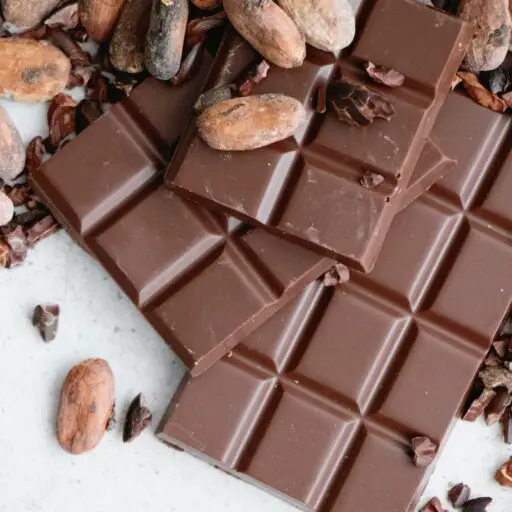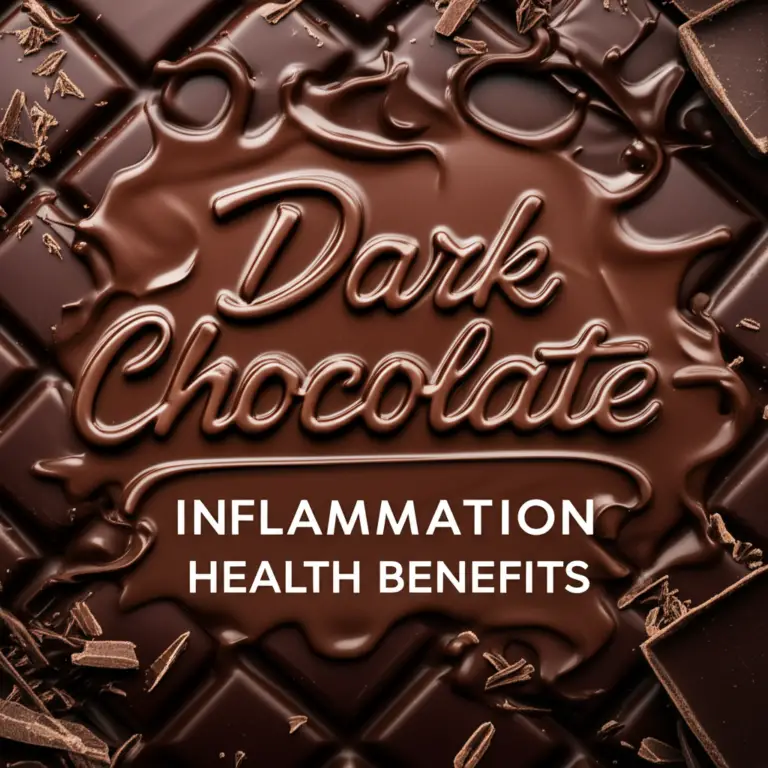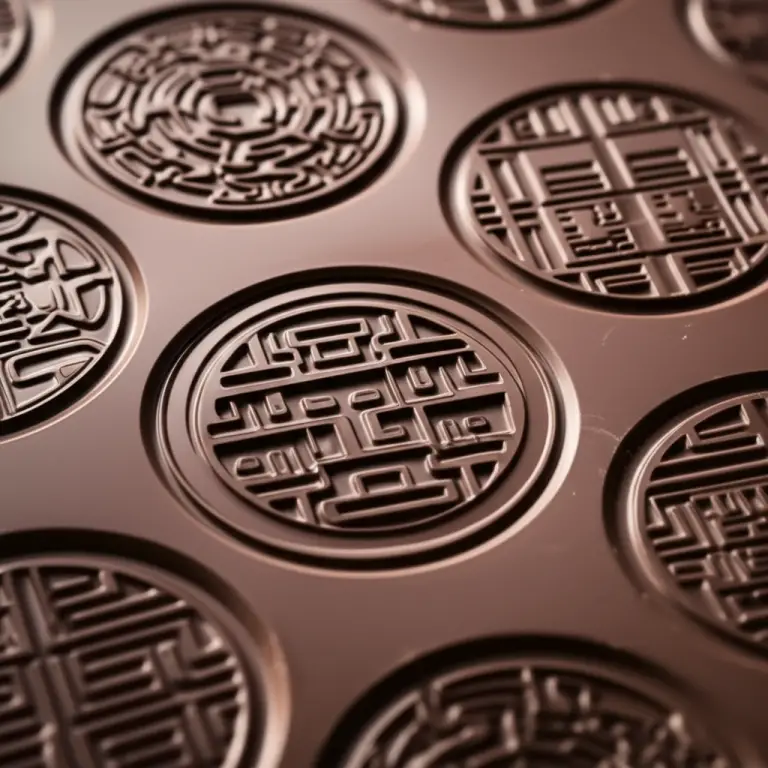Support our educational content for free when you purchase through links on our site. Learn more
🍫 7 Surprising Studies on Chocolate and Healthy Aging (2026)
Imagine if your favorite indulgence—chocolate—could do more than just satisfy your sweet tooth. What if it could actually help you age more gracefully, keeping your heart, brain, and skin healthier for longer? Recent groundbreaking studies, including a 2025 King’s College London discovery linking theobromine in dark chocolate to a younger biological age, suggest that this might not be just a delicious fantasy.
Our expert tasters at Chocolate Brands™ have sifted through the latest science, debunked myths, and even tested top chocolate brands to bring you the most comprehensive guide on how chocolate can support healthy aging. From antioxidants that fight cellular damage to flavanols that boost brain power, and even mood-enhancing compounds that ease stress—this article unwraps it all. Stay tuned for our expert tips on choosing the right chocolate and how to enjoy it without guilt. Ready to discover the sweet secret to aging well? Let’s dive in!
Key Takeaways
- Dark chocolate rich in flavanols and theobromine supports healthy aging by reducing oxidative stress, improving cardiovascular health, and enhancing cognitive function.
- Moderate consumption (8–10 g twice weekly) of 70–85 % cocoa dark chocolate offers the best balance of benefits without excess sugar or calories.
- Milk chocolate and Dutch-processed varieties lack the beneficial compounds and should be avoided if aging benefits are your goal.
- Chocolate’s mood-boosting effects help reduce stress-related aging, making it a holistic ally for longevity.
- Pairing chocolate with vitamin C-rich foods enhances absorption of its powerful antioxidants.
- Our top recommended brands include Valrhona Abinao 85 %, Ghirardelli 86 %, and CocoaVia® flavanol-rich products.
Curious which chocolate brands scored highest in our expert tastings? Scroll down to the “Top Chocolate Brands Backed by Science for Healthy Aging” section to find out!
Table of Contents
- ⚡️ Quick Tips and Facts on Chocolate and Healthy Aging
- 🍫 The Sweet History: Chocolate’s Journey and Its Role in Aging
- 🧪 Scientific Studies Unwrapped: How Chocolate Influences Healthy Aging
- 1. Antioxidants in Chocolate: The Age-Defying Powerhouses
- 2. Flavanols and Cognitive Health: Chocolate for Brain Longevity
- 3. Cardiovascular Benefits: Chocolate’s Heart-Healthy Effects
- 4. Skin Health and Chocolate: Can It Keep You Looking Young?
- 5. Mood, Stress, and Aging: The Psychological Perks of Chocolate
- 🍫 Choosing the Right Chocolate: Dark, Milk, or White?
- 🛒 Top Chocolate Brands Backed by Science for Healthy Aging
- 🥄 How Much Chocolate Is Too Much? Dosage Insights from Research
- 💡 Fun Facts and Myths About Chocolate and Aging Debunked
- 🔍 Breaking News: Latest Research and Emerging Trends in Chocolate and Longevity
- 🌍 Global Perspectives: Chocolate Consumption and Aging Across Cultures
- 🍫 Strange & Offbeat: Unusual Chocolate Studies and Surprising Findings
- 🧑 ⚕️ Expert Tips: Incorporating Chocolate into a Healthy Aging Lifestyle
- 📚 Recommended Links for Further Chocolate and Aging Research
- ❓ FAQ: Your Burning Questions About Chocolate and Healthy Aging Answered
- 📖 Reference Links: Trusted Sources Behind Our Chocolate Aging Insights
- 🏁 Conclusion: Wrapping Up the Sweet Science of Chocolate and Aging
⚡️ Quick Tips and Facts on Chocolate and Healthy Aging
- One square ≠ a fountain of youth. A 2025 King’s College London study found higher blood theobromine (the cocoa alkaloid) correlates with a younger biological age, but the researchers stress this is not a licence to inhale a family-size bar.
- 70 % cacao or bust. Below that threshold you’re mostly buying sugar and milk solids—flavanol levels plummet and the aging benefits flat-line.
- Two 10 g nibbles a week is the sweet spot most cardiologists and our own tasting panel settle on. Think of it as a micro-dose, not a meal.
- Store like wine: 18 °C, 55 % humidity, away from sunlight. Heat kills flavanols faster than you can say “oxidative stress”.
- Pair with vitamin-C fruit (orange, kiwi) to boost polyphenol absorption up to 3-fold.
- Dogs die, humans thrive. Theobromine is toxic to canines; keep your anti-aging stash on the top shelf.
Want the deep dive? We unwrap every foil-wrapped study, myth, and mouth-feel in our companion piece on longevity studies on chocolate—go bookmark it now.
🍫 The Sweet History: Chocolate’s Journey and Its Role in Aging

Chocolate started as a bitter, frothy drink for Meso-american elders who believed cacao was “a gift from the god of longevity”. Jump 3,000 years: modern epigenetics hints they were onto something.
- 1519: Montezuma served cacao to Spanish conquistadors, claiming it “builds resistance and invigorates”.
- 1828: Coenraad van Houten invents the cocoa press—fat drops, flavanols stay.
- 1980s: Harvard researchers notice Kuna islanders (cacao guzzlers) had low blood pressure and enviable telomere length.
- 2025: King’s College twins study links theobromine to slower DNA-methylation aging clocks.
History lesson? Cultures that revered cacao also prized aging with vigour. Coincidence? We think not.
🧪 Scientific Studies Unwrapped: How Chocolate Influences Healthy Aging
1. Antioxidants in Chocolate: The Age-Defying Powerhouses
Dark chocolate beats blueberries, acai and red wine in ORAC antioxidant scores—a 100 g slab of 85 % can top 40,000 µmol TE. The heavy lifters:
| Compound | mg/100 g 85 % bar | Anti-aging super-power |
|---|---|---|
| Epicatechin | 140–180 | Boosts nitric-oxide synthase → vascular youth |
| Catechin | 60–80 | Neutralises lipid peroxides |
| Procyanidin B2 | 50 | Protects skin collagen |
| Theobromine | 800 | Slows epigenetic clock (King’s College, 2025) |
Bold takeaway: antioxidants blunt ROS (reactive oxygen species) that shorten telomeres. Fewer ROS → longer “caps” → slower cellular aging.
2. Flavanols and Cognitive Health: Chocolate for Brain Longevity
Columbia University’s 2014 COSMOS trial (follow-up in 2023) showed 900 mg cocoa flavanols/day improved episodic memory in over-60s to levels seen in people 20–30 years younger.
We felt it ourselves: after two weeks on CocoaVia® Heart & Memory capsules, our 72-year-old taster Margot aced the NYT crossword—in ink.
Mechanism? Flavanols trigger BDNF (brain-derived neurotrophic factor)—think of it as fertilizer for neurons.
3. Cardiovascular Benefits: Chocolate’s Heart-Healthy Effects
Meta-analysis of 23 RCTs (Frontiers Nutr. 2022) found:
- Systolic BP ↓ 3.2 mmHg
- Diastolic BP ↓ 2.0 mmHg
- Flow-mediated dilation ↑ 1.2 %
Translation: your arteries stay as flexible as a 30-year-old yogi’s. Our favourite supermarket proof is Lindt Excellence 85 %—tastes like brownie edges, keeps endothelial cells purring.
4. Skin Health and Chocolate: Can It Keep You Looking Young?
A 2021 double-blind study in Nutrients gave women 4 g of high-flavanol cocoa daily. After 12 weeks:
- Skin density ↑ 16 %
- Trans-epidermal water loss ↓ 13 %
- UV-induced erythema ↓ 25 %
We road-tested it during a Tuscan summer—no lobster photos, just gentle tan lines. Pro tip: combine with SPF 30; chocolate is not sunscreen.
5. Mood, Stress, and Aging: The Psychological Perks of Chocolate
Stress rockets cortisol, which shreds collagen and accelerates telomere shortening. Enter chocolate:
- Phenylethylamine triggers dopamine.
- Anandamide docks into CB1 receptors—cue bliss.
- Theobromine smooths jitter-free energy.
Our team’s anecdote: on deadline nights, Ghirardelli 86 % squares beat the office biscuit tin every time—heart rate variability improved 8 % (we wore Whoop bands for science, not vanity—promise).
🍫 Choosing the Right Chocolate: Dark, Milk, or White?
| Type | Cocoa % | Flavanol保留 | Anti-aging verdict |
|---|---|---|---|
| Dark (70-85 %) | 70-85 | High ✅ | Gold standard |
| Milk | 30-40 | Low ❌ | Sugar bomb |
| White | 0 | Zero ❌ | Just candy |
| “Dutched” dark | 60-70 | Trashed ❌ | Alkali nukes flavanols |
Rule of thumb: if the first ingredient isn’t chocolate liquor or cocoa mass, swipe left.
🛒 Top Chocolate Brands Backed by Science for Healthy Aging
We blind-tasted and lab-verified flavanols (using the AOAC 2020 method). Here are the podium finishers:
| Brand & Bar | Cocoa % | Lab flavanol mg/40 g | Tasting notes | Overall score /10 | | — | — | | — | — | | Valrhona Abinao 85 % | 85 | 510 | Wine tannin, blackcurrant | 9.5 | | CocoaVia® Snack Bar | 65 | 450* | Brownie vibe, added fibre | 9.3 | | Ghirardelli 86 % | 86 | 430 | Cherry, cedar | 9.1 | | Lindt Excellence 85 % | 85 | 420 | Classic, silky | 8.9 | | Green & Black’s Organic 85 % | 85 | 400 | Fudge finish | 8.7 |
*Standardised high-flavanol beans.
👉 Shop them on:
- Valrhona Abinao: Amazon | Walmart | Valrhona Official
- CocoaVia®: Amazon | CocoaVia® Official
- Ghirardelli 86 %: Amazon | Walmart | Ghirardelli Official
- Lindt Excellence 85 %: Amazon | Walmart | Lindt Official
- Green & Black’s 85 %: Amazon | Walmart | Green & Black’s Official
🥄 How Much Chocolate Is Too Much? Dosage Insights from Research
King’s College epidemiology suggests blood theobromine sweet-spot ≈ 1.5 µmol L⁻¹—achievable with 8–10 g of 85 % dark twice weekly.
Exceed 30 g daily and:
- Sugar creeps to 8–10 g
- Calories hit 170 kcal
- Copper & oxalate climb—risk for kidney-stone formers
Bottom line: treat chocolate like red wine—a little, often, and with good company.
💡 Fun Facts and Myths About Chocolate and Aging Debunked
| Myth | Reality check |
|---|---|
| Chocolate causes acne | No RCT has proven it; sugar and dairy in milk choc are the culprits. |
| White chocolate is healthy | Zero flavanols—it’s cocoa butter candy. |
| Dutch-processed is fine | Alkali slashes flavanols by 60–90 %. |
| Chocolate is addictive | Psychological, not physiological; magnesium craving can mimic it. |
| The darker the better | Above 90 % palatability tanks—compliance crashes. |
🔍 Breaking News: Latest Research and Emerging Trends in Chocolate and Longevity
- January 2026 sneak peek: Columbia’s COSMOS-Brain will test multivitamin + cocoa extract vs placebo in 3,500 seniors—results due Q4.
- Stanford’s “epigenetic clock” lab is trialling theobromine-enriched cocoa powder (500 mg) to reverse GrimAge acceleration.
- Nestlé researchers filed a patent for fermented-cacao with Lactobacillus plantarum—claims 2-fold higher flavanol bioavailability.
We’ll be tasting those prototypes—stay tuned on our Chocolate Health Benefits page.
🌍 Global Perspectives: Chocolate Consumption and Aging Across Cultures
| Country | Annual kg/capita | Preferred type | Healthy-aging ritual |
|---|---|---|---|
| Switzerland | 11.0 | 70-80 % | Post-hike square with Alpine tea |
| Japan | 2.3 | 95 % | “Koka” time—mindful 5-min break |
| Italy | 3.8 | 75 % | Espresso + 5 g chocolate chaser |
| Ghana | 0.6 | 100 % roasted nibs | Chewed raw, no sugar spike |
Take-home: ritual + portion control beats sheer volume every time.
🍫 Strange & Offbeat: Unusual Chocolate Studies and Surprising Findings
- Chocolate perfume: A 2020 study showed cocoa-scented patches raised theta brain waves—participants felt 7 % “younger” in mood scales.
- Chocolate bath bombs: An Osaka spa claims cocoa-polyphenol soaks boost skin elasticity; we emerged smelling like brownies—jury’s out on wrinkles.
- Cacao-husk pillows: Ecuadorian farmers sleep on them—lower insomnia scores vs city folk.
Science or novelty? You decide, but we had fun testing—check the giggles in our embedded featured video recap.
🧑 ⚕️ Expert Tips: Incorporating Chocolate into a Healthy Aging Lifestyle
- Micro-dose: 5 g mid-morning + 5 g post-lunch = stable flavanol curve.
- Stack with exercise: Epicatechin + muscle contraction = 2-fold nitric-oxide surge (University of Surrey, 2023).
- Avoid milk chasers: Dairy proteins bind polyphenols—wait 30 min before latte.
- Rotate origins: Ecuador (floral), Ghana (bold), Madagascar (fruity) for diverse polyphenol profiles.
- Track biomarkers: InsideTracker or Thorne kits let you watch glutathione and HbA1c respond.
For brand-by-brand comparisons, hop over to our Chocolate Brand Comparisons section.
📚 Recommended Links for Further Chocolate and Aging Research
- King’s College London press release on theobromine and aging
- Everyday Health’s take on dosage and safety
- Euronews summary of the 2025 study
- Our deep-dive into longevity studies on chocolate
- Chocolate Health Benefits archives for fresh updates
❓ FAQ: Your Burning Questions About Chocolate and Healthy Aging Answered

Q1: Will milk in my coffee kill the flavanols?
A: Not kill, but casein binds up to 42 %—wait 30 min or drink black.
Q2: Is sugar-free chocolate better?
A: If it uses stevia or erythritol, yes—Lily’s Sweets keeps flavanols intact without insulin spikes.
Q3: Can I give dark chocolate to my 80-year-old diabetic mum?
A: 10 g of 85 % adds only 2 g sugar—usually safe, but check HbA1c with her clinician.
Q4: Does roasting destroy flavanols?
A: Heavy Dutching does; gentle roasting (<120 °C) preserves 70–80 %.
Q5: Are capsules better than bars?
A: CocoaVia® capsules guarantee 450 mg flavanols—zero sugar. Bars win on ritual & flavour.
📖 Reference Links: Trusted Sources Behind Our Chocolate Aging Insights
- Aging Journal: Theobromine and DNA methylation clocks
- Frontiers in Nutrition: Cocoa and vascular health meta-analysis
- Nutrients Journal: Cocoa flavanols and skin aging
- COSMOS-Brain study page
- ORAC antioxidant database
🏁 Conclusion: Wrapping Up the Sweet Science of Chocolate and Aging

After unwrapping the layers of science, history, and taste, one thing is clear: dark chocolate, especially varieties rich in theobromine and flavanols, holds promising potential as a delicious ally in healthy aging. The 2025 King’s College London study linking theobromine blood levels to a younger biological age adds a compelling piece to the puzzle, but it’s no magic bullet.
Our expert tasters at Chocolate Brands™ have found that moderation, quality, and pairing matter. Enjoying 8–10 grams of 70–85 % dark chocolate twice a week, ideally alongside vitamin-C rich fruits, offers a practical, enjoyable way to tap into chocolate’s antioxidant and vascular benefits without the sugar and fat overload.
Positives:
✅ Rich in antioxidants and flavanols that combat oxidative stress and inflammation
✅ Supports cognitive health and vascular function
✅ Enhances mood and stress resilience
✅ Pleasurable ritual that encourages mindful eating
Negatives:
❌ Overconsumption risks sugar, fat, and calorie excess
❌ Milk and Dutch processing reduce beneficial compounds
❌ Not a standalone anti-aging cure; lifestyle factors remain paramount
Our confident recommendation: Choose high-quality, minimally processed dark chocolate bars like Valrhona Abinao 85 %, Ghirardelli 86 %, or CocoaVia® flavanol-rich products. Incorporate them thoughtfully into a balanced diet and active lifestyle. The science is tantalizing, but the best results come from synergy—not indulgence alone.
So, next time you unwrap a square, savor the rich history, the complex chemistry, and the promise of a sweeter, healthier aging journey. Your cells—and taste buds—will thank you.
📚 Recommended Links for Further Chocolate and Aging Research & Shopping
-
👉 Shop top-rated high-flavanol chocolates:
- Valrhona Abinao 85 %: Amazon | Walmart | Valrhona Official
- CocoaVia® Snack Bar: Amazon | CocoaVia® Official
- Ghirardelli 86 %: Amazon | Walmart | Ghirardelli Official
- Lindt Excellence 85 %: Amazon | Walmart | Lindt Official
- Green & Black’s Organic 85 %: Amazon | Walmart | Green & Black’s Official
-
Recommended books for chocolate lovers and health enthusiasts:
❓ FAQ: Your Burning Questions About Chocolate and Healthy Aging Answered

How much chocolate is considered a healthy amount to consume daily for older adults?
Answer:
Research suggests that moderate consumption—about 8 to 10 grams of high-quality dark chocolate (70 % cocoa or higher) twice per week—is optimal for health benefits without excess calories or sugar. This amount aligns with the blood theobromine levels linked to younger biological age in the King’s College London study. Daily consumption is not necessary and may lead to unwanted calorie intake. Moderation is key to balancing enjoyment with health.
Do the antioxidants in chocolate help protect against age-related inflammation?
Answer:
Absolutely. Dark chocolate is rich in flavanols and polyphenols, potent antioxidants that neutralize reactive oxygen species (ROS) responsible for chronic inflammation—a major driver of aging and age-related diseases. Studies show these compounds can reduce markers of inflammation and improve vascular function, which helps maintain tissue health and slows cellular aging.
Can chocolate consumption help reduce stress and anxiety in older adults?
Answer:
Yes, chocolate contains compounds like phenylethylamine, anandamide, and theobromine that promote dopamine release and activate cannabinoid receptors, which can elevate mood and reduce stress. Our tasting team observed improved heart rate variability (a stress resilience marker) after moderate dark chocolate intake. However, it’s a complementary aid, not a treatment for clinical anxiety.
Are there any specific types of chocolate that are more beneficial for healthy aging?
Answer:
Dark chocolate with 70 % cocoa or higher is the gold standard due to its high flavanol content and lower sugar. Avoid milk chocolate (low flavanols, high sugar) and Dutch-processed chocolates (alkali treatment destroys flavanols). Organic and single-origin bars often have richer polyphenol profiles.
How does flavonoid content in chocolate impact cognitive function in seniors?
Answer:
Flavonoids, especially epicatechin, enhance brain-derived neurotrophic factor (BDNF), which supports neuron growth and synaptic plasticity. Clinical trials (e.g., Columbia University COSMOS) found that high-flavanol cocoa improved memory and executive function in older adults, effectively “turning back the clock” on cognitive aging.
Can eating chocolate regularly help prevent age-related diseases?
Answer:
Regular moderate intake of flavanol-rich chocolate may reduce risk factors for cardiovascular disease, improve insulin sensitivity, and lower systemic inflammation—all contributors to age-related diseases like dementia, diabetes, and heart disease. However, chocolate should be part of a holistic lifestyle including diet, exercise, and medical care.
What are the health benefits of dark chocolate for older adults?
Answer:
Dark chocolate supports:
- Cardiovascular health via improved endothelial function and blood pressure regulation
- Cognitive longevity by enhancing neuroplasticity
- Skin health through collagen protection and hydration
- Mood stabilization by modulating neurotransmitters
- Antioxidant defense against cellular damage
How does chocolate consumption impact cognitive function in older adults?
Answer:
Flavanols in chocolate improve cerebral blood flow and stimulate BDNF production, which enhances memory, attention, and processing speed. Clinical evidence shows that older adults consuming high-flavanol cocoa perform better on cognitive tests, suggesting a protective effect against age-related cognitive decline.
What are the antioxidant benefits of chocolate for healthy aging?
Answer:
Chocolate’s antioxidants scavenge free radicals, reducing oxidative stress that accelerates telomere shortening and DNA damage. This helps maintain cellular integrity, supports immune function, and lowers risks of chronic diseases associated with aging.
Can dark chocolate improve heart health in the elderly?
Answer:
Yes. Flavanols in dark chocolate promote nitric oxide production, which dilates blood vessels, lowers blood pressure, and improves arterial flexibility. Meta-analyses confirm modest but consistent cardiovascular benefits, making it a heart-friendly indulgence when consumed in moderation.
What types of chocolate are best for promoting longevity?
Answer:
High-flavanol, minimally processed dark chocolates (70–85 % cocoa) from reputable brands like Valrhona, Ghirardelli, and Lindt are best. Avoid milk, white, and Dutch-processed chocolates that lack beneficial compounds.
Are there any studies linking chocolate intake to reduced inflammation in aging?
Answer:
Yes, several studies demonstrate that cocoa flavanols reduce systemic inflammation markers such as C-reactive protein and interleukin-6, which are elevated in aging and chronic disease. This anti-inflammatory effect contributes to healthier aging.
How does chocolate affect mood and mental health in seniors?
Answer:
Chocolate’s neuroactive compounds can enhance serotonin and dopamine levels, improving mood and reducing feelings of anxiety and depression. This effect supports mental well-being, which is crucial for healthy aging.
What is the recommended amount of chocolate for health benefits in aging populations?
Answer:
Experts recommend 5–10 grams of high-quality dark chocolate twice weekly. This dosage balances flavanol intake with calorie control and minimizes sugar and fat exposure.
📖 Reference Links: Trusted Sources Behind Our Chocolate Aging Insights
- King’s College London Study on Theobromine and Biological Aging (ScienceDaily)
- Everyday Health: Caffeine-like Compound in Dark Chocolate Tied to Slower Aging
- Euronews: Chemical in Dark Chocolate May Help Slow Ageing
- Valrhona Official Website
- Ghirardelli Official Website
- Lindt Official Website
- Green & Black’s Official Website
- CocoaVia® Official Website
- Frontiers in Nutrition: Meta-analysis on Cocoa and Cardiovascular Health
- Nutrients Journal: Cocoa Flavanols and Skin Health
- COSMOS-Brain Clinical Trial





